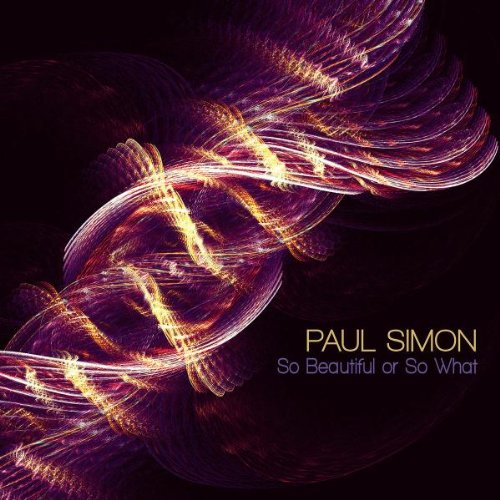
I have the misfortune of trying to love philosophy and God at the same time. The difficulties in doing both are boring and well-chronicled. Suffice to say that it wears on my already-weak spirit, to shift from the Bible, wherein God changes his mind, to the classroom, wherein God cannot change. My mind blisters to hear my priest say that God “sings and dances over his children,” delights in our works and sorrows over our sins — only to hear from my professor that God cannot be affected by his creatures.
Now it’d be far too easy throw up my hands and call the God of philosophy a monstrosity of human reason, foreign to the living God. Theoretically, and after a cup of coffee, I agree with Cardinal Ratzinger: There is no antipathy between the God of faith and the God of reason. But it was neither a theologian or a philosopher that pointed me out of this particularly soul-sucking pit and towards a peaceful synthesis of the head and the heart — it was Paul Simon.
 When Paul Simon’s “So Beautiful or So What” came out in 2012, it was heralded as an eminently spiritual work. Simon himself, a “God-chronicler by accident,” seemed surprised by the angels, saints, and Evangelical sermons spilling over the edge of his lyrics. “It’s funny,” he said in a promotional video for the album, “because for somebody who’s not a religious person, God comes up a lot in my songs…There was a show I did about a year and a half ago and Paul McCartney was there and he came back after the show and he said, ‘Aren’t you Jewish?’” — a reference to how often Simon ends up singing about Jesus. But this emphasis on a recent spiritual surge (“maybe we’ll see a resurgence of religiosity from Simon–or even a Christian conversion?” said one blogger) seems silly. Simon’s lyrics have smelled of incense since the “& Garfunkel” era. Likewise, the emphasis of critics on a vague “spirituality,” while certainly in line with Simon’s self-proclaimed lack of religion, miss what McCartney saw: Jesus is the prominent combatant in Paul Simon’s wrestling match with the divine.
When Paul Simon’s “So Beautiful or So What” came out in 2012, it was heralded as an eminently spiritual work. Simon himself, a “God-chronicler by accident,” seemed surprised by the angels, saints, and Evangelical sermons spilling over the edge of his lyrics. “It’s funny,” he said in a promotional video for the album, “because for somebody who’s not a religious person, God comes up a lot in my songs…There was a show I did about a year and a half ago and Paul McCartney was there and he came back after the show and he said, ‘Aren’t you Jewish?’” — a reference to how often Simon ends up singing about Jesus. But this emphasis on a recent spiritual surge (“maybe we’ll see a resurgence of religiosity from Simon–or even a Christian conversion?” said one blogger) seems silly. Simon’s lyrics have smelled of incense since the “& Garfunkel” era. Likewise, the emphasis of critics on a vague “spirituality,” while certainly in line with Simon’s self-proclaimed lack of religion, miss what McCartney saw: Jesus is the prominent combatant in Paul Simon’s wrestling match with the divine.
(Jesus — that’s the guy! He’s there when I pray, there when I participate in the liturgy, but let me do philosophy, and voosh! Suddenly I am a Muslim, a Jew, and my dear Jesus has skedaddled behind the trees in my mind. It’s all “Eternal Deity” — none of this “Father, Son, and Holy Ghost” stuff.)
Simon approaches The Eternal God with a combination of awe, unbelief, and reverence, singing “here I am Lord / I’m knocking at your place of business / I know I ain’t got no business here.” The absolute and uncomfortable distance between humanity and divinity colors songs like Wartime Prayers: “You cannot walk with the holy / If you’re just a halfway decent man.” This eminently Jewish understanding of the absolute transcendence of God receives its clearest expression in The Afterlife:
After you climb up the ladder of time
The Lord God is near
Face-to-face in the vastness of space
Your words disappearAnd you feel like you’re swimming in an ocean of love
And the current is strong
But all that remains when you try to explain
Is a fragment of songLord, is it Be Bop a Lula? Or ooh Papa Doo?
God is, quite simply, beyond comprehension. We may have questions and concerns — but our words will disappear when we see him face to face. If Simon left it here, I’d be left with the Incomprehensible, Unknowable and Absolute Other — the talkative, concerned deity of Scripture a mere embarrassment. But if Simon’s words disappear when he considers God, they become colloquial when he considers Jesus.
Some people say Jesus, that’s the ace in the hole
But I never met the man so I don’t really know
Maybe some Christmas, if I’m sick and alone
He will look up my number
Call me on the phone, and say
“Hey, boy, where you been so long?
Don’t you know me?
I’m your ace in the hole.”
If Simon’s flippancy is offensive, it is no more offensive than Christianity itself. Songs that describe the arrival of God in the manner humanity expects God to arrive miss the Christian paradox. Jesus is heroic, the perfection of every virtue, the fount of wisdom, yes — but were Apollo to descend and dwell among the Greeks, we would expect precisely the same description from their songwriters. God did not “come down” from Heaven as we expected. He became man as we never could have expected. The accent mark that offended the Greeks and still offends us today is precisely this humanity — a humanity best described in its frailty and weakness. This, I think, is why I took to tearing up whenever I listened to The Cool, Cool River. Here, an ambiguous soldier takes on the persona of Christ:
And these streets
Quiet as a sleeping army
Send their battered dreams to heaven, to heaven
For the mother’s restless son
Who is a witness to, who is a warrior
Who denies his urge to break and run
Who says, “Hard times?
I’m used to them
The speeding planet burns
I’m used to that
My life’s so common it disappears.
It is precisely because Christ’s life, without losing a speck of its divinity, is “so common it disappears,” precisely because God Himself can “feel the urge to break and run” in his assumed human nature (as Jesus undoubtedly did before his Crucifixion) that we can know our frail, failing humanity really has been assumed into the Life of God. And if our humanity really has been assumed into the one God, then there is a manner in which we can say, without fear and without resorting to metaphor, that God is affected by us, that God exists in a real relation to his creatures, living among us, eating meals, singing songs, comforting and being comforted — God our brother.
This idea reaches a sort of poetic climax in Love is Eternal Sacred Light — a theological treatise if there ever was one. Here Simon sings in as the voice of The Eternal God in a (rare) gravelly baritone:
Big Bang
That’s a joke that I made up
Once when I had eons to kill
You know, most folks
They don’t get when I’m joking
Well, maybe someday they willLove me
Love me
That’s the main request I receive
Well you know I love all my children
And it tears me up when I leave
Then he rips out of his deep, fatherly voice and into that high, bright clarity that makes him so instantly recognizable:
But sometimes you gotta fly down that highway
Free as a bird, knock on wood, thank the Lord
I am driving along in my automobile
It’s a brand new pre-owned ’96 Ford
How can we hear anything but the voice of the Father and the Son united in a single song? In Simon’s theatrical shift of voice as much as his lyrical shift of scenery, God becomes incarnate, becomes God in our Ford, becomes God twitching with human restlessness. The overemphasis on the incomprehensibility of God the Father, whose “joke” of creation we cannot understand, meets an overemphasis on Christ’s radical comprehensibility, whose need to “fly down that highway” we can all understand. The resulting emotion, I would argue, is an eminently Christian one, for Christianity is the state of shock with which contemplate God’s becoming man. It is precisely the truth of God being Eternal and Unchanging that makes the truth of his becoming man such a mercy, such a surprise — such a hilarious and unexpected gift. It is precisely the truth of God’s incomprehensibility that makes Jesus, “the image of the invisible God” such a delight.
Obviously, this does not solve all the problems, but it does make for a fundamental change in attitude. Before, every realization of the absolute estrangement of Eternity and Time, the Creator and his Creation would leave little bubbles of despair in the corners of my brain. Now these realizations are the very ground and condition for being surprised by the salvific work of Jesus Christ.
Taken doctrinally, the poetry of Paul Simon can be misleading. Jesus, after all, is not some other, more relatable God. He and the Father are “One.” He is the very self-revelation of the Father. But Simon isn’t preaching. He recently told Christianity Today that, “quite often, people read or hear things in my songs that I think are more true than what I wrote…I feel I’m like a vessel, and it passed through me, and I’m glad.” Taken in this light, Simon serves as a vessel for a poetic christology, in which the radicalness of God-become-man is expressed in over-exaggerated lyric and sound, and we are reminded of the rudeness, the indecency, and the scandal of the Incarnation. So thank you, Mr. Simon, for getting me through a dark time.











